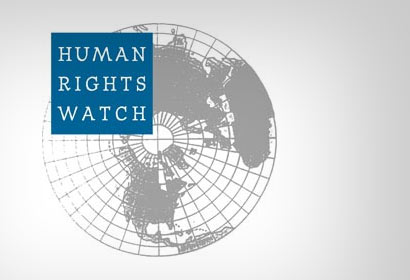HRW: new government makes significant progress

Sri Lanka‘s government, elected in January 2015, ended the pervasive culture of surveillance and censorship and embarked on reforms aimed to undo years of increasingly authoritarian rule, Human Rights Watch said today in its World Report 2016. While it opened dialogues both domestically and abroad, the government still faces key concerns, including wartime accountability and prolonged detention without trial.
In the 659-page World Report 2016, its 26th edition, Human Rights Watch reviews human rights practices in more than 90 countries. In his introductory essay, Executive Director Kenneth Roth writes that the spread of terrorist attacks beyond the Middle East and the huge flows of refugees spawned by repression and conflict led many governments to curtail rights in misguided efforts to protect their security. At the same time, authoritarian governments throughout the world, fearful of peaceful dissent that is often magnified by social media, embarked on the most intense crackdown on independent groups in recent times.
“Sri Lanka’s new government has begun to address some of the country’s chronic human rights problems, but much remains to be done,” said Brad Adams, Asia director. “The pervasive culture of fear is largely gone and positive measures have been adopted, but the previous government’s disastrous restructuring of independent state institutions needs to be fully dismantled.
The government of President Maithripala Sirisena promptly initiated a series of constitutional reforms, including establishing a constitutional council and restoring the independence of the judiciary, police, and human rights commissions. Civil society groups are once again able to speak out safely on issues of concern. In December, the government signed the United Nations Convention against Enforced Disappearance, a step toward tackling a massive decades-long problem.
The government has yet to fulfill its pledge to abolish the draconian Prevention of Terrorism Act (PTA). Authorities agreed to release some PTA detainees on bail, “rehabilitate” others, and prosecute the remainder, but arrests under the PTA continued throughout the year. Inadequate information from the security forces means there are no reliable numbers on those detained under the law. Moreover, many imprisoned PTA detainees were convicted after being tortured to confess. The government has still not put forth a plan to provide redress for those unjustly detained under the PTA.
In August, the UN Office of the High Commissioner for Human Rights issued a scathing report on unlawful attacks, killings, torture, sexual violence, and attacks on relief aid by both sides during the civil war with the Liberation Tigers of Tamil Eelam that ended in 2009. At the Human Rights Council in October 2015, member states including Sri Lanka endorsed a consensus resolution calling on the Sri Lankan government to implement the report’s many recommendations, including to establish a special counsel to investigate and prosecute alleged wartime abuses, and to include foreign judges and prosecutors in a Sri Lankan tribunal.
Soon after the council resolution passed, the government began the process of public consultations on accountability and truth mechanisms. The government also began to investigate some emblematic rights violations during the conflict, including the killing and enforced disappearance of journalists, but progress remained slow. Chronic abuses distinct from the civil war, such as police abuse and security sector reform, also need to be addressed.
“For years Sri Lanka was sinking deeper into human rights despair, so the changed atmosphere under the new government has given hope to many victims of past abuses, civil society activists, and international observers,” Adams said. “It’s now time for the Sirisena government to turn its positive words and initial actions into institutional changes that will have a lasting impact on the country,” it said.
(Courtesy: Ada Derana)
Latest Headlines in Sri Lanka
- Chinthaka Hewapathirana elected new Chairman of Weligama Pradeshiya Sabha February 2, 2026
- Sri Lanka to protect and develop 3.1 Billion-ton quartz reserve in Monaragala February 2, 2026
- Police Inspector, Constable arrested over missing gun at Matugama Police Station February 2, 2026
- Sri Lanka allows women to work at night as sanitary and food service workers February 1, 2026
- India pledges INR 4 Billion aid to Sri Lanka in 2026-2027 Budget February 1, 2026



This is the catch…………”including to establish a special counsel to investigate and prosecute alleged wartime abuses, and to include foreign judges and prosecutors in a Sri Lankan tribunal.” This what you call in Sinhala ‘Oluwa atha gaala tokkak anna’. HE president already told SL doesn’t need foreign judges & prosecutors. Hope HE will stick to his guns.
Dancing to the tune of western slave drivers is the only f**king progress these fools make…